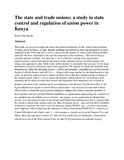| dc.description.abstract | This study set out to investigate the legal and political machinery for the control and regulation of union power in Kenya as built, shaped, modified and reinforced since the emergence of trade- unionism in the 1930s and also to survey and record the manner in which trade unions and their rank-and-file have responded to the specific demands of that machinery. The state in Kenya - colonial and post-colonial - has from the o~set of effective working class organization endeavoured to control and regulate the power of the emergent unions. In both instances the ruling class appealed to_the~mYth of the 'public interest' to rationalise the necessity for the legal institutions erected to effectuate control and regulation.
The manner in which this myth has been drummed up within the labouring classes - workers and peasants - propelled us to go beyond. the facade of official rhetoric and selCl..h,,~~_things really hang together. In the Introduction to this study we therefore endeavoured to underl~ne those forces that have influenced the evolution of the control system with a v i.ew to expose the interests which control ser-ves in Kenya. Sub- sequently the lli~alysis revealed that control ruld regulation were imperative not so much to promote and protect the 'common good' as tesafeguard class interests. For the llet eiᆪect ot 'the legal and peli=tical regime of control Was to emasculate t~ade un Lens in terms both of their effectiveness as eeenemic power groups fighting to enhance the relative eeenolnic pesition of their members and also of their Pblitieai eredibility as organizations representing the ~ntereᄃts of an exploited and subordinate class in sGsiety, ~he regime, as its examination in Chapter One reveals; was calculated not only to discourage 'peiit1Gaii trade unionism but also to circumscribe the extent to which trade unions could Use 'their' eGenemic power - derived from theTr members Goiiestive exercise of the will to work Or til>sta.in .fij'&m WGPl{i-.ng .:: to wrest concessions from employet's Md tG pegu-late the substance of those concessions# HoWSVS~f ~e history of Union Officialdom and rᄋanl{.=and .ユユ. .tile response to control, surveyed in Chapters Two and. Three, show that repressive control of i--Mus-Gi?i-al conflict has its limitations., Limit-ations whi-ch ari.se out of the ᄋvery nature of the rei-ati611S
Qf production in capitalist Society. | en_US |

